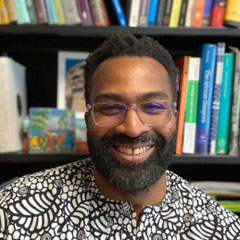Jody Benjamin
Participant, Committee on African Studies
Q. Your research agenda summed up in one sentence:
My research focuses on western African history (Senegal, Mali, Guinea) during the eighteenth and nineteenth centuries, and includes questions of African Diaspora and transnational history.
Q. Broadly speaking, what is the key aim of your research?
To center the significant contributions of continental African history both to the “early modern” period and to contemporary realities; and to push the conversation beyond standard approaches to the Atlantic slave trade and colonialism in Africa.
Q. What is your current project?
“The Texture of Change: Cloth, Commerce and History in Western Africa, 1700-1850.” In it, I explore how people across space and time deployed textiles and dress to claim individual or group status. I argue that choices made within a set of ecological, political and economic constraints structured networks connecting the Atlantic and Indian Ocean perimeters in the pre-modern era.
Q: Why study textiles, in particular?
Textiles were a major industry within the entire West African region going back centuries. They also were the biggest “global” industry of the period I study. At the heart of what became the Industrial Revolution.
Q. Any new developments in your work?
Recently, I received a fellowship from the National Endowment for the Humanities to complete my first book. I have been invited to give a talk about my research this fall as part of the Distinguished Africanist Lecture series at the University of Chicago this fall.
Q. When friends and family ask what you love about your work, how do you answer?
I tell them that I get to spend time learning deeply about people, places and processes that have shaped our contemporary lives in ways large and small. Then I get to share what I’ve learned with other scholars, students and different audiences all over the world. How awesome! (Don’t mention all the long hours, though!)
Q. A favorite podcast:
Africa Past and Present: the podcast about African history, culture and politics (afripod.aodl.org); Afropop Worldwide with Georges Collinet (afropop.org).
Q.What have you learned from teaching?
That less can be more. Capturing a student’s genuine interest and giving them tools to take ownership of a particular topic or set of questions makes for much better learning than lots of lecture slides and tons of reading. Mix it up. Try new things. Once you earn their buy-in, amazing things are possible.
Q: If you could change one thing about the academy:
I would like to see an academy where scholars were generally more reflective about their enormous privileges (yes, you’ve earned them, but then what?), more conscious about the (non-verbal) messages they send to students and society, more generous toward their colleagues, and more deliberate about paying it all forward.
Q. Something people might be amazed to know about you:
I got my love of reading from generations in my family. I inherited a large library of books and music from my grandfather who was an autodidact because he had to be. I am the first in our family to (have the opportunity) to earn a doctorate and work as a scholar.
—
In Focus is a new interview series that features faculty associates of the Center for Ideas and Society.

